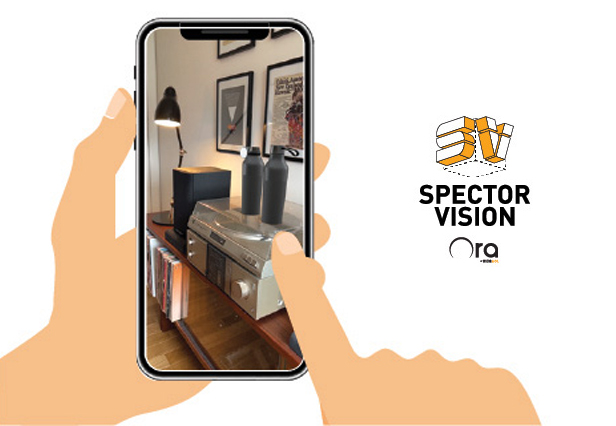Sustainability July 11, 2022
Spector & Co. Employs Augmented Reality Promo Samples
QR codes on the supplier’s website and catalog allow you to preview how various products look in your home or office – a sustainable strategy that helps reduce reliance on physical samples.
Montreal-based Spector & Co. (asi/88660) is taking a high-tech approach to sustainability – using augmented reality (AR) to cut down on the need for product samples.
“There’s a big process in even just sending a sample, with the shipping, packaging and all that,” says Evan Tarakjian, creative lead at Spector. “If that could be eliminated even just a little bit, I think that’s a great foot forward.”

Spector has incorporated augmented reality into its new drinkware lineup – in part as a sustainability effort – to cut down on the need for physical samples.
The supplier recently launched what it’s calling “Spector Vision” with its new line of Ora drinkware. When you visit Spector’s Ora site or flip through the drinkware catalog, you’re presented with a QR code. Scan it, and a 3D-rendered version of the drinkware style you selected will appear wherever you place it – on your desktop, coffee table or countertop. (The interface is similar to playing AR-enabled games like Pokémon Go, though Spector doesn’t require you to catch ’em all.)
“Being able to see what it looks like in your unique space is super-valuable,” Tarakjian says. “You can see to scale in pretty detailed view what these bottles look like in real life. What you’re seeing is what you’re going to be getting at the end of the day.”
Spector’s foray into 3D modeling began during the pandemic, when sales meetings transitioned to video calls. The supplier wasn’t satisfied with the way its products came across when held up in front of a webcam, so it decided to create a virtual showroom to showcase its Ora products.
“It’s a virtual world with all of our products in a virtual space. We wanted to mimic exactly what it was like in the real world,” Tarakjian says. “What’s really cool is that you can pick up these products, look at them, manipulate the product and get every angle.” Plus, when you pick up an item from the virtual showroom, all the relevant information about it appears on your screen.
Playing with @spectorandco AR feature this afternoon. #AugmentedReality #PromotionalProducts pic.twitter.com/6nA744OAG2
— Theresa Hegel (@TheresaHegel) July 8, 2022
Spector had the 3D assets for each product created in-house – a process that took about six months, according to Tarakjian. The artists involved in the project would use physical samples so they could “measure to the millimeter” the product’s dimensions and details to ensure that the virtual versions were scaled properly. Once the assets were finished, it was a simple matter to create QR codes for each product so they could be easily rendered in AR.
View this post on Instagram
Spector’s use of both QR codes and AR fit nicely with tech trends happening in the broader market. QR codes made a comeback during the pandemic – partly because of improved smartphone technology and partly because of an increased desire for touchless technology. Brands are using them for a variety of purposes, including sharing sustainability details of a product or helping people discover new music to stream. Social media apps and e-commerce sites have been incorporating AR onto their platforms – Pinterest, for example, has a shopping feature that lets people “try out” various furniture pieces using their smartphones.
Tarakjian is the first to admit that AR is no match for the real thing. “Nothing will ever come exactly close to the real physical product where you can feel the texture variations,” he says. But Spector has spent a lot of time trying to get as close as possible. “That was our mission in developing Spector Vision,” he adds.
The 3D renders are realistic enough, in fact, that Spector has been able to use them in product photography – swapping drinkware into various backgrounds without having to go to the trouble and expense of doing real photography, according to Tarakjian.
The next step for Spector is to create 3D assets for all of its best-selling products – not just its Ora line – so they can become AR samples as well. “For us, it’s been really, really valuable,” Tarakjian says. “We’ve had some great feedback on the details that we were able to get into these 3D models.”

Promo for the Planet is your destination for the latest news, biggest trends and best ideas to help build a more sustainable and socially-responsible industry.
